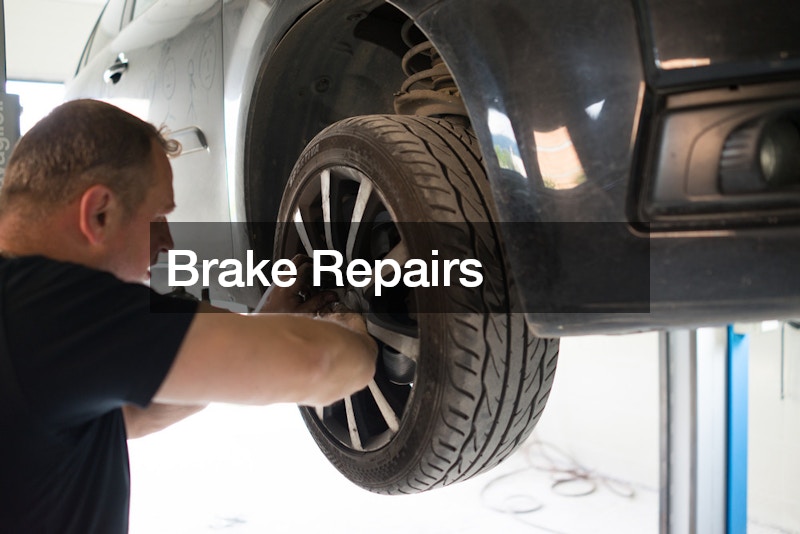Owning a vehicle comes with a multitude of responsibilities. Regular maintenance and timely repairs are crucial to ensure safety, longevity, and optimal performance. Here, we delve into nine of the most pressing auto repairs that every driver should prioritize to keep their vehicle running smoothly and safely.
1. Brake Repairs

One of the most critical systems in any vehicle is the braking system. Brakes repairs should never be delayed, as they directly impact your safety on the road. The brake system comprises various components such as brake pads, rotors, and calipers, which work together to slow down or stop your vehicle.
Symptoms of brake issues include squeaking or grinding noises, a soft brake pedal, or a noticeable vibration when braking. If you experience any of these signs, it’s essential to visit an auto mechanic immediately. Regular brake inspections can help identify problems early, ensuring you stay safe while driving. Ignoring brake issues can lead to complete brake failure, which is not only dangerous but can also result in more costly repairs.
The importance of brake repairs cannot be overstated. Ensuring that your brakes are in optimal condition involves regular checks of the brake fluid, pads, and rotors. The brake fluid needs to be at the right level and free from contaminants. Brake pads should have enough thickness to function correctly, and rotors should be free from warping. These components work together to ensure that your vehicle can stop effectively. Regular maintenance and prompt repairs of the braking system are essential for safe driving.
2. Tire Maintenance and Sales
Tires are the only part of your vehicle that touch the road, making them crucial for safety and performance. Regular tire maintenance, including rotation, balancing, and alignment, can significantly extend the life of your tires and improve your vehicle’s handling.
Uneven tire wear, frequent air pressure loss, or a noticeable decrease in traction are signs that you may need new tires. Many tire sales centers offer comprehensive services, from selecting the right tires to professional installation. Ensuring your tires are in top condition not only enhances safety but also improves fuel efficiency.
When selecting new tires, consider factors such as the type of driving you do, the climate you live in, and your vehicle’s specifications. For example, all-season tires are suitable for a variety of conditions, but if you live in an area with heavy snowfall, winter tires might be a better option. Properly inflated and maintained tires contribute to better fuel economy, improved handling, and increased safety. Regularly checking the tire pressure, tread depth, and overall condition can help you identify issues early and avoid unexpected tire failures.
3. Vehicle Diagnostics
Modern vehicles are equipped with complex computer systems that monitor and control various functions. When something goes wrong, these systems generate error codes that can be identified through vehicle diagnostics. This process involves connecting a diagnostic tool to your car’s onboard computer to retrieve these codes and pinpoint the issues.
Ignoring warning lights on your dashboard can lead to severe problems down the line. Regular vehicle diagnostics can help detect issues early, allowing for timely repairs and preventing costly damage. Auto mechanics have the expertise and tools to interpret diagnostic codes and recommend the necessary repairs.
The vehicle diagnostic process is crucial for identifying issues that might not be immediately apparent. For instance, a check engine light could indicate a range of problems, from a loose gas cap to a serious engine issue. Using a diagnostic tool, mechanics can quickly determine the cause and address it before it leads to more significant damage. Regular diagnostics can also help improve fuel efficiency and performance by ensuring that your vehicle’s systems are operating correctly.
4. Engine Repairs

The engine is the heart of your vehicle, and keeping it in good condition is vital for your car’s performance and longevity. Engine repairs can range from simple tasks like replacing spark plugs and filters to more complex jobs like addressing timing belt issues or fixing oil leaks.
Regular oil changes, using high-quality oil and filters, and following the manufacturer’s recommended maintenance schedule can help keep your engine running smoothly. If you notice unusual noises, smoke, or a decrease in performance, it’s time to consult with a professional mechanic. Feel free to inquire about carbon raschig rings with auto experts.
Engine problems can manifest in various ways, such as knocking noises, reduced power, or increased fuel consumption. Addressing these issues promptly can prevent more extensive and costly repairs. For example, a small oil leak can lead to significant engine damage if left unattended. Regular maintenance tasks like changing the oil, replacing filters, and inspecting belts and hoses can help you avoid major engine problems. Ensuring that your engine is in good working condition is essential for the overall health and longevity of your vehicle.
5. Diesel Engine Repairs
For those who drive diesel-powered vehicles, searching through diesel engine mechanic shops is crucial. Diesel engines have unique characteristics and require specific knowledge for maintenance and repairs. These engines are known for their durability and efficiency, but they also have their own set of challenges.
Common diesel engine issues include injector problems, turbocharger failures, and issues with diesel AC parts. Regular maintenance, including fuel system cleaning and timely oil changes, can help prevent many of these problems. If you drive a diesel vehicle, ensure you have a reliable diesel engine mechanic shop that understands the intricacies of diesel engines.
Diesel engines operate at higher compression ratios and temperatures compared to gasoline engines, which means they require different maintenance procedures. Regularly checking and replacing the fuel filters, ensuring the turbocharger is functioning correctly, and maintaining the cooling system are essential for keeping a diesel engine in good condition. Diesel engines are also more sensitive to fuel quality, so using high-quality diesel and additives can help prevent injector and fuel system issues. Regular maintenance by a specialized mechanic can help you avoid common diesel engine problems and keep your vehicle running efficiently.
6. Windshield Replacement

A cracked or chipped windshield is not only a cosmetic issue but also a safety hazard. The windshield plays a crucial role in the structural integrity of your vehicle and protects you from debris and harsh weather conditions.
Small chips can often be repaired, but larger cracks usually require a complete windshield replacement. Ignoring windshield damage can lead to further cracking, making the repair more expensive and compromising your safety. Many car detailing services also offer windshield repair and replacement, ensuring your vehicle remains safe and visually appealing.
The importance of a clear and undamaged windshield extends beyond visibility. A damaged windshield can compromise the structural integrity of your vehicle, especially in the event of a rollover accident. It also supports the deployment of airbags, ensuring they function correctly. If your windshield is damaged, it’s essential to address it promptly. Professional services can evaluate the extent of the damage and determine whether a repair or replacement is necessary. Regular inspections of the windshield can help you identify minor chips and cracks before they become major issues.
7. Suspension and Steering Repairs
The suspension and steering systems are vital for maintaining control and comfort while driving. These systems absorb shocks from the road and allow you to steer the vehicle accurately. Issues with these systems can lead to a rough ride, poor handling, and increased tire wear.
Common symptoms of suspension or steering problems include a pulling sensation to one side, uneven tire wear, or a noticeable decrease in ride comfort. Regular inspections and timely repairs can prevent these issues from worsening and ensure a smooth and safe driving experience.
The suspension system includes components such as shocks, struts, and springs, which work together to provide a smooth ride. Over time, these components can wear out, leading to a decrease in ride quality and handling. Regular inspections can help identify worn or damaged parts before they fail completely. The steering system, including the power steering pump and rack and pinion, is also crucial for vehicle control. If you notice any changes in steering response or hear unusual noises when turning the wheel, it’s essential to have the system inspected and repaired. Ensuring that your suspension and steering systems are in good condition is vital for safe and comfortable driving.
8. Exhaust System Repairs
The exhaust system is responsible for directing harmful gases away from the engine and reducing emissions. A faulty exhaust system can lead to increased noise, decreased fuel efficiency, and higher emissions.
Common exhaust system issues include rusted or broken pipes, damaged mufflers, and issues with the catalytic converter. If you notice a loud noise or a decrease in performance, it’s essential to have your exhaust system inspected and repaired by a professional mechanic.
The exhaust system plays a crucial role in reducing harmful emissions and maintaining engine performance. A damaged or leaking exhaust can allow toxic gases to enter the cabin, posing a health risk to the occupants. Regular inspections can help identify issues such as rust or damage to the pipes, mufflers, or catalytic converters. Replacing these components as needed ensures that your vehicle remains environmentally friendly and operates efficiently. Additionally, a properly functioning exhaust system reduces noise, contributing to a more comfortable driving experience.
9. Car Detailing and Ceramic Coatings
While a car detailing service might not seem as critical as other repairs, maintaining your vehicle’s exterior and interior can significantly enhance its longevity and resale value. Detailing involves thorough cleaning, polishing, and protecting various surfaces of your vehicle.
One of the most popular detailing options today is ceramic coatings. These coatings provide a durable, protective layer that enhances the vehicle’s appearance and protects it from environmental damage. Regular detailing and applying ceramic coatings can keep your vehicle looking new and protect it from the elements.
Car detailing goes beyond simple cleaning. It involves deep cleaning of the interior, including carpets, seats, and dashboards, as well as exterior cleaning and polishing. This process removes dirt, grime, and contaminants that can cause long-term damage to your vehicle’s surfaces. Ceramic coatings offer additional protection by creating a hard, protective layer that repels water, dirt, and other contaminants. This not only keeps your vehicle looking great but also makes it easier to clean. Regular detailing and ceramic coatings can help maintain your vehicle’s appearance and protect its value over time.
Electrical System Repairs
Modern vehicles have complex electrical systems that control everything from the engine to the entertainment system. Electrical issues can be challenging to diagnose and repair, requiring specialized knowledge and tools.
Common electrical problems include faulty wiring, battery issues, and malfunctioning sensors. If you experience problems with your vehicle’s electrical system, it’s essential to consult with an experienced auto mechanic who can accurately diagnose and fix the issue.
The electrical system is essential for the proper functioning of various components in your vehicle. Issues with the battery, alternator, or wiring can lead to problems such as a dead engine, malfunctioning lights, or non-operational accessories. Regular inspections and maintenance can help identify potential problems before they cause significant issues. For example, checking the battery and alternator for proper function, ensuring that all lights are working, and inspecting wiring for signs of wear or damage can help prevent electrical failures. Addressing electrical problems promptly ensures that your vehicle’s systems operate correctly and safely.
10. Transmission Repairs

The transmission is responsible for transferring power from the engine to the wheels, allowing your vehicle to move. Transmission problems can manifest as slipping gears, delayed shifting, or strange noises.
Regular transmission maintenance, including fluid changes and inspections, can help prevent major issues. If you notice any signs of transmission problems, it’s crucial to address them immediately to avoid costly repairs and ensure your vehicle’s performance.
Transmission issues can significantly impact your vehicle’s performance and drivability. Common problems include slipping gears, difficulty shifting, and fluid leaks. Regular maintenance, such as checking and changing the transmission fluid, can help prevent these issues. If you notice any changes in your vehicle’s shifting or performance, it’s essential to have the transmission inspected by a professional mechanic. Early detection and repair of transmission problems can prevent more extensive and costly repairs down the line.
11. Cooling System Repairs
The cooling system prevents your engine from overheating, which can cause significant damage. Common cooling system issues include radiator leaks, thermostat failures, and problems with the water pump.
Regular inspections and timely repairs can help keep your cooling system functioning correctly. If you notice your engine running hot or see coolant leaks, it’s essential to have your cooling system checked by a professional mechanic.
The cooling system is crucial for maintaining the optimal operating temperature of your engine. Overheating can lead to serious engine damage, including warped cylinder heads and blown head gaskets. Regular maintenance, such as flushing the coolant, checking the radiator, and inspecting hoses and the water pump, can help prevent overheating. If you notice any signs of cooling system problems, such as a high-temperature gauge or coolant leaks, it’s essential to address them immediately. Ensuring that your cooling system is functioning correctly helps protect your engine and maintain its performance.
12. Fuel System Repairs
The fuel system is responsible for delivering fuel to the engine, and any issues can lead to poor performance and decreased fuel efficiency. Common fuel system problems include clogged fuel filters, fuel pump failures, and injector issues.
Regular maintenance, such as changing fuel filters and using high-quality fuel, can help prevent many fuel system problems. If you experience a loss of power or notice unusual noises from your fuel system, it’s essential to have it inspected and repaired promptly.
The fuel system is essential for delivering the correct amount of fuel to the engine for optimal performance. Issues such as clogged fuel filters or failing fuel pumps can lead to reduced power and efficiency. Regular maintenance, including replacing fuel filters and ensuring that the fuel injectors are clean, can help prevent these problems. If you notice any signs of fuel system issues, such as difficulty starting the engine or reduced power, it’s important to have the system inspected and repaired. Maintaining a healthy fuel system ensures that your vehicle runs efficiently and reliably.
13. Air Conditioning Repairs
A properly functioning air conditioning system is essential for comfort, especially during hot weather. Common AC issues include refrigerant leaks, compressor failures, and problems with the condenser.
If your vehicle’s AC system isn’t cooling effectively, it’s essential to have it checked by a professional. Regular maintenance, including recharging the refrigerant and inspecting the system for leaks, can help keep your AC system in top condition.
The air conditioning system is crucial for maintaining comfort in your vehicle, especially during hot weather. Common issues such as refrigerant leaks or failing compressors can lead to a loss of cooling. Regular maintenance, including checking the refrigerant levels and inspecting the compressor and condenser, can help prevent these issues. If you notice that your AC system isn’t cooling effectively or hear unusual noises, it’s essential to have it inspected and repaired. Keeping your air conditioning system in good condition ensures that you remain comfortable while driving.
Addressing Minor Issues
Many minor issues can be addressed through regular maintenance and timely repairs. These include replacing worn-out wiper blades, ensuring all lights are functioning correctly, and keeping your vehicle clean inside and out.
Regular maintenance, such as oil changes, tire rotations, and brake inspections, can help prevent many minor issues from becoming major problems. Staying on top of these small tasks can save you time and money in the long run and ensure your vehicle remains safe and reliable.
Minor issues such as worn-out wiper blades or malfunctioning lights can quickly become significant problems if not addressed promptly. Regularly checking and replacing these components ensures that your vehicle remains safe and functional. Additionally, keeping your vehicle clean inside and out can help prevent long-term damage and maintain its appearance. Regular maintenance tasks such as oil changes and tire rotations can also help prevent more serious issues from developing. By staying proactive and addressing minor issues promptly, you can ensure that your vehicle remains in good condition and avoid costly repairs.
Choosing the Right Auto Mechanic
Finding a reliable and skilled auto mechanic is crucial for maintaining your vehicle. Look for mechanics with good reviews, certifications, and experience with your specific make and model. A trustworthy mechanic can help you stay on top of regular maintenance and address any issues promptly.
Choosing the right mechanic involves doing some research and asking for recommendations. Look for mechanics who are certified by reputable organizations such as the National Institute for Automotive Service Excellence (ASE). Reading reviews and asking friends or family for recommendations can also help you find a reliable mechanic. A good mechanic can help you maintain your vehicle, diagnose and repair issues, and provide advice on preventive maintenance. Building a relationship with a trusted mechanic can help ensure that your vehicle remains in good condition and that any repairs are done correctly and efficiently.











